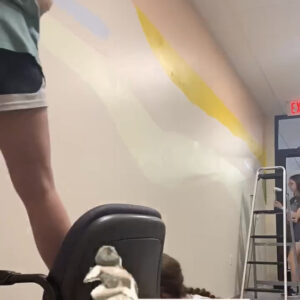Photo by: Will Gentry
Each semester brings with it a habitual action for returning students: class registration. Oklahoma Christian University students have multiple ways of determining which classes and professors would best suit their academic needs.
“If it’s one of my favorite professors I would take them first,” junior Lizzy Rojas said. “And if it’s not them I would ask around … and see who is better and I would ask my advisor, because sometimes they tend to know either about the professor or how they teach.”
For many teachers, enrollment for new classes means they are publically rated on social media. Thanks to websites such as www.ratemyprofessor.com, students can give their opinions about a professor within four categories: helpfulness, easiness, clarity and hotness.
“I definitely think students should have as much information as they can,” Associate Professor of Mathematics Paul Howard said. “So if they can get information from something like that I think it’s a good thing.”
Rate My Professor has a certain standing within the college community.
“I would ask around, ask my friends and see who they liked, and then I would go on Rate My Professor and then I would wing it after that,” sophomore Ellyn Reid said.
Howard’s answer regarding his opinion of the website may come as a surprise.
“It doesn’t bother me,” Howard said. “I am who I am. I honestly change things if I read things … students shouldn’t take a site like that and use that as your end-all answer because sometimes one student can have a bad experience and rip a professor and another student can have a great experience and not.”
The website does have potential disadvantages.
“I don’t think [Rate My Professor] is the greatest thing ever for the classes that I’ve used it for,” Rojas said. “It didn’t always have up-to-date information on my professors. Maybe it might have been from a few years back or it might not have been like the greatest information on my professors, not as much as I would like to know.”
Some people are disgruntled with the system’s classifications, however.
“I think organization would be a good [classification] too, like class organization,” Reid said. “And I would take away the hotness one too, because it’s stupid.”
Howard had an idea of what should be changed to better suit students’ needs.
“[Rate My Professor would be better] if they describe the person who was rating,” Howard said. “If they filled out a quick 10 questions and put them in a learning-style group.”
Rate My Professor is not the only way students choose classes and teachers.
Social media outlets such as Facebook and Twitter also provide ways to gain information regarding school scheduling.
“I see people tweet about like, ‘Oh I love this professor,’” Reid said. “So I think that if I had seen a professor that someone had tweeted about saying [someone] liked them, I would be more inclined to pick them.”
According to Howard, caution should be considered when basing decisions on reviews that come from websites and social media.
“If someone hates math and they are rating a math professor, I’m going to be a little leery about what they say, because they don’t like math to begin with,” Howard said. “Most of the students that don’t rate me well I have a feeling don’t like math coming in. So their frustration with math sort of goes over into how they feel about me, which is why I don’t take things too personal.”
Reid echoed Howard’s sentiments.
“It’s people giving reviews, so I think some people give an unfair review just because they have a personal vendetta against the teacher,” Reid said.
Overall, there aren’t too many options for students when determining which classes and which professors to take.
“OC is a small place so there is not a lot of choices,” Howard said. “If I had to rank the places, I would probably say fellow students first, Rate My Professor second, and other faculty third if those were the three sources.”
These surveys make a difference for the Oklahoma Christian academic year, both for fellow classmates and for faculty who read the comments.
“The comments are the best indicators for me,” Howard said. “I’ll make changes based on comments because even when students are harsh, they’re usually somewhat correct somewhere, so I can adjust from that.”















Be First to Comment